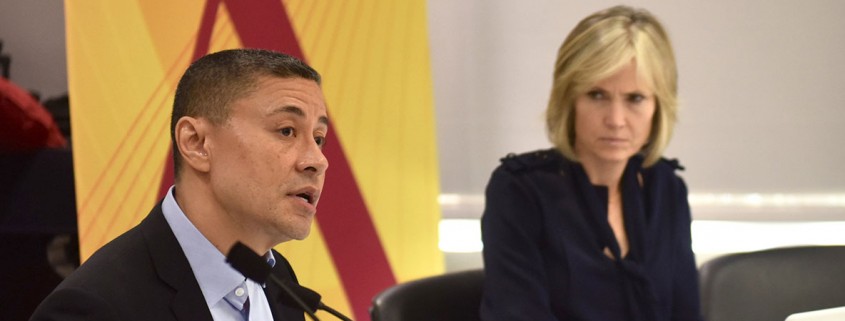Panel analyzes media inclusion, diversity
Diversity and inclusion in media organizations was the topic of discussion at a panel held in Wallis Annenberg Hall Tuesday. The panel featured Executive Vice President and Chief Diversity Officer for NBCUniversal Craig Robinson and Director of the Annenberg School of Journalism Willow Bay.
Robinson, who is in charge of defining and maintaining a corporate culture throughout NBCUniversal, explained ways to instill the values of inclusion and discussed the lack of diversity in the current media industry.
He made note of the difficulties that underrepresented groups endure in the media industry along with the high standards that are held for them. Robinson acknowledged that studies on diversity representation show problems within media companies.
“I feel embarrassed for us as an industry, but I am thankful more than anything else, because this information gives us something tangible to point to,” Robinson said.
He also acknowledged the fact that it is much easier to make a change when the problem is noticeable because it makes the problem one that is impossible to brush off.
After noting the issues that are prevalent, Robinson explained how he works toward eliminating the problem of inclusivity.
In 2013, Comcast purchased NBCU, and with this purchase came the question of company culture. Robinson explained that it is often difficult to get large companies to listen.
“The larger the company becomes, the less concerned it becomes about diversity and inclusion because it becomes less of a priority,” Robinson said.
With the acquisition of NBCU by Comcast, there was a higher percentage of people of color and a higher percentage women at each level of the company, showing that value of diversity and inclusion was not forsaken.
Instead, Robinson said, the company embraced the value of diversity and inclusion and used it better the environment of the company through the implementation of programs that aim to keep the discussion of diversity an ongoing one.
“Infrastructure really does matter because it puts things into people’s muscle memory,” Robinson said.
For this reason, diversity pipeline programs have been created in order to make the discussion of diversity a continuous one. These programs help recruit younger people for union and county jobs at NBCU.
“It’s a level of exposure that drives the pool,” Robinson said.
Robinson explains that NBCU will continue to recruit employees from different backgrounds starting from a young age and create awareness about the diversity of opportunities at NBCU.
This program has proven to be effective in getting people of all backgrounds involved and prevalent in the media industry; in fact, Aziz Ansari, an Indian-American actor and comedian, rose to fame from a NBCU pipeline program.
The Late Night program is an example of a diversity pipeline program that aims to develop emerging talent behind the camera. He explained that this is a fairly exclusive group because people tend to gravitate towards who they like and people who are similar to themselves.
“Late night writers are a real ‘fraternity,’” Robinson said.
In order to deter this exclusivity, the Late Night program focuses on exposing talented joke, sketch and comedy writers to NBCU’s late night and readying them for a staff position.
In the end, Robinson made it clear that lack of diversity is a problem that needs to be addressed today’s society, and it will be most effectively done if the discussion on diversity and inclusion is continued and acknowledge.
“Our focus here today is in media, but this is a societal problem,” Robinson said.

